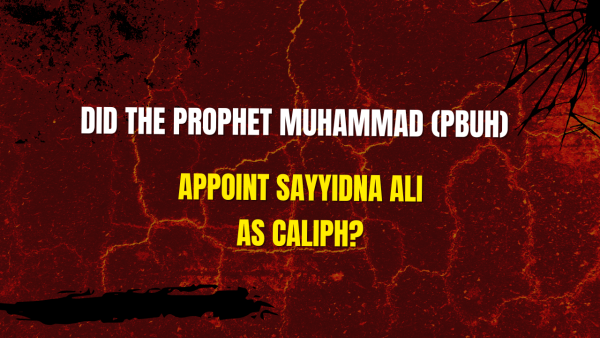Hazrat Ali (may Allah be pleased with him) is a very important and bright part of Islamic history. He was
- The cousin of Prophet Muhammad (peace be upon him)
- The son-in-law of Prophet Muhammad (married to his daughter)
- A close friend and companion of the Prophet (peace be upon him)
- Part of the Prophet’s family
Love for him reflects true faith, while hatred reveals hypocrisy. Unfortunately, some people twist the Prophet Muhammad’s (peace be upon him) teachings to support their personal views and prejudices. Their interpretations lack support from Hazrat Ali’s own words and actions, from other respected members of the Prophet’s family, or from the broader consensus of Muslim scholars (Ijmaah).
These people then claim that accepting their fabricated stories about Hazrat Ali proves your love for him, while rejecting these false accounts means you hate him.
We reject these fabricated interpretations and false praise as genuine expressions of love for Hazrat Ali. True love must be grounded in the Quran, the Prophet’s teachings (Sunnah), the beliefs of his companions, and the understanding of the Prophet’s family, not in emotions or invented stories.
Remember this: We, the Ahlus Sunnah Wal Jama’at, only accept verified truths about Hazrat Ali. We reject anything that appears to honor him but is actually based on falsehoods.
It’s completely wrong to invent false stories and then demand that everyone believe them as proof of love and respect. Because we genuinely love Hazrat Ali, we must reject the lies told about him.
One well-known false claim is that the Prophet Muhammad (peace be upon him) explicitly appointed Hazrat Ali as his successor. To support this claim, they cite two hadith from Ahl-us-Sunnah sources as evidence.
The first saying is that the beloved Prophet Muhammad (peace be upon him) said:
“Are you not happy that your position to me is like Haroon’s position to Musa, except that there will be no prophet after me?” 1
We acknowledge that this hadith truly demonstrates Hazrat Ali’s (may Allah be pleased with him) special status. However, it doesn’t explicitly mention leadership (Caliphate), and the full context shows it wasn’t meant to establish his succession.
The Prophet Muhammad (peace be upon him) spoke these words to console Hazrat Ali, reassure him, and affirm his important position. This becomes clear from the following points:
- Did Haroon become the leader after Musa? No, everyone agrees he didn’t! He actually passed away while Musa was still alive. So, comparing it like this to leadership isn’t right. 2
- The Prophet Muhammad (peace be upon him) sometimes left other companions in charge temporarily when he was away (like for battles, Hajj, or Umrah). But none of them ever used that as a reason to claim they should be the leader (Caliph). 3
- The Prophet Muhammad (peace be upon him) said this when Hazrat Ali was asked to stay in Madinah to care for the Prophet’s family during the Battle of Tabuk. Hazrat Ali felt upset about being left behind, and some troublemakers mocked him, claiming the Prophet saw him as a burden. The Prophet’s words were meant to console and reassure him, which is clear from the full narration of the Hadith. 4
Similarly, as their second proof, they bring up another saying of the Prophet Muhammad (peace be upon him):
“Whomever I am his Mawla (master/friend), Ali is also his Mawla.”
Based on this same saying, some people celebrate the 18th day of Dhul-Hijjah as “Eid al-Ghadir Khumm” and say it was the day Hazrat Ali’s leadership (Caliphate) was announced. This claim is also wrong for many reasons:
- This claim is not proven by the Quran or the Sunnah, nor by what the companions did. The truth is, this “Eid” and practices of mourning were started in the year 352 AH by a person named Mu’izz al-Dawla. This alone is enough to show it’s a new, wrong practice! 5
- Using this Using this hadith to claim Hazrat Ali was the immediate successor is completely wrong. These words weren’t meant to announce his leadership but to resolve temporary complaints from some companions and highlight his special status. If succession was intended, the Prophet would have used clear terms like “Khalifa” (leader) or “Wali” (ruler).
What actually happened was that the Prophet appointed Hazrat Ali (may Allah be pleased with him) as commander in Yemen to handle war spoils. Some companions, particularly Hazrat Buraydah Aslami (may Allah be pleased with him), became upset with certain decisions Ali made (though Ali’s decisions were correct). Hazrat Buraydah himself reported:
“I was so upset with Ali that I felt a kind of hatred for him in my heart.”
So, the beloved Prophet Muhammad (peace be upon him) asked him if he disliked Ali. When he confirmed that he did, the Prophet corrected this feeling. 6
These were the main reasons why the Prophet gave a speech at Ghadir Khumm (a place on the road from Makkah to Madinah).
- Surely, this speech proves Hazrat Ali’s extraordinary virtue and that it’s forbidden to hate him, which all believers agree on. But using this story to prove that Hazrat Ali was immediately the next leader goes against both the context of the Hadith and its clear words. This is because in the hadith of Ghadir, “Mawla” means friend, not ruler; otherwise, “Wali” would have been said. The full Hadith also makes this meaning clear. 7
- If Hazrat Ali (may Allah be pleased with him) was truly the Prophet’s chosen successor, then why did Hazrat Abbas (may Allah be pleased with him) want to ask about leadership during the Prophet’s final illness, and why did he want to bring Hazrat Ali along to ask? Didn’t he know about the Ghadir Khumm event, which he himself witnessed?? 8
- If Hazrat Abbas had forgotten the Ghadir announcement, Hazrat Ali could have reminded him. But Hazrat Ali never used it as proof of his leadership either. 9
- Hazrat Ali (may Allah be pleased with him) himself avoided asking the Prophet about the right to lead until the very end. He was worried that if the Prophet said no, he would be deprived forever. 10
- If Hazrat Ali was the Prophet’s chosen successor, then why did he accept the authority of the three Caliphs before him? Also, according to Shia belief, he is the “Solver of Problems” (Mushkil Kusha). They must either abandon this belief or drop the claim of his appointment as successor –both cannot be true simultaneously.
So, to sum up everything we’ve talked about:
- Using these two sayings (about Musa/Haroon and “Mawla”) to prove Hazrat Ali’s succession is wrong. It contradicts historical facts, sound reasoning, and the dignity of the Prophet’s companions and family.
- Hazrat Ali’s own life, words, and actions clearly demonstrate that he never believed the Prophet had appointed him as successor.
- The claim of Ali’s immediate succession is not only false but also misleading. Our religion should be understood through the Quran, the Prophet’s teachings (Sunnah), and the companions’ understanding, not through political theories or sectarian interpretations that emerged later.
- Loving Hazrat Ali is indeed part of our faith. This love requires us to recognize his virtues based on the Quran, Sunnah, and authentic accounts. The truth is, Hazrat Ali’s genuine qualities are so remarkable that we need no fabrications whatsoever! False virtues are typically invented for those lacking real ones. Therefore, lying about him actually dishonors his greatness and turns his elevated status into a matter of dispute rather than clarity.
Therefore, we must avoid all innovations, wrong practices, and false beliefs. We should follow the clear guidance of the Quran and Sunnah, and the path of the companions, so we can achieve success and well-being.
May Allah grant us the ability to act upon this…Ameen.
_____________________________________________
1-(Sahih Bukhari 4416)
2- (Al-Bidayah wa’l-Nihayah 1/317,318)
3- (Tabaqat Ibn Sa’ad, p: 8 to 135 Volume: 2)
4-(Sahih Bukhari: 4416) (Seerat Ibn Hisham p: 520, volume: 2)
5-(For details: Al-Kamil li Ibn Athir (549/8) Al-Bidayah li Ibn Kathir (11/ 243, 265)
6- (Sahih Bukhari 4350)
7-(Silsilatul Ahadith as Sahihah: 3271)
8-(Sahih Bukhari: 4447)
9-(Sahih Bukhari: 4447)
10-(Sahih Bukhari: 4447)













Leave a Reply